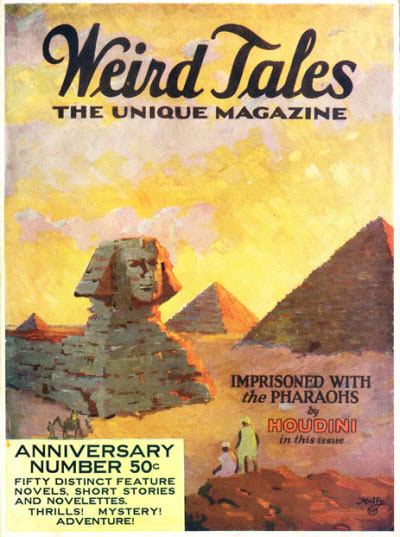
Do you keep a back-up of your manuscript in progress? Do you keep a copy of your completed works? And, if so, do you keep them in a safe place?
Even if you’ve answered yes to all three questions, read on for a few hints for keeping back-ups safe that might seem paranoid, but, well, you’ll thank me later if everything goes pear-shaped.
But first, a couple of tales from the crypt of lost manuscripts…
In 1924, the fantasy and horror writer HP Lovecraft was commissioned by a magazine editor to ghostwrite an account by escapologist Harry Houdini of a supposedly true story.
It was to be written in first-person as Houdini.
Lovecraft realised the tale about being kidnapped and escaping from beneath the Great Pyramid of Giza was a load of guff, but he was highly motivated by the $100 advance he was given. Worth more than $1500 today, it was the largest advance he’d yet seen.
He threw himself into his work and spent much time researching the location and Egyptology at New York’s Metropolitan Museum of Art.
Lovecraft completed the story – then lost his only copy of the manuscript at a railway station while on his way to get married. He had to spend much of his honeymoon retyping the tale.
One dares say that his new bride was not impressed.

Another wife who was not impressed was Fanny Stevenson, wife of Scottish novellist Robert Louis Stevenson.
It was thought for years that the writer had deliberately burned the first handwritten draft of Dr Jekyll and Mr Hyde himself. It was suggested that, trusting his wife’s judgement that he’d not done the tale justice, he decided he couldn’t do a proper rewrite if he had the faulty draft to fall back on at all.
Years later it came out in a discovered letter that she thought the story was distasteful, would fail like some recent previous works had done, and would sully what good name he had left at a time when the family was deep in debt with creditors at the door.
So, she tossed it on the fire and watched it burn.
Stevenson, half-mad at the time from chronic lung disease and the cocaine used to treat it, saw the ashes – then rewrote the manuscript by hand in a three-day blur.
When published, Dr Jekyll and Mr Hyde was an instant hit and not considered distasteful at all. In fact, it was quoted by preachers far and wide as a cautionary tale of morality.
Stevenson can hardly be blamed for not having a copy of a handwritten manuscript, but Lovecraft should have at least sprung for a few sheets of carbon paper while typing.
Modern back-ups
It’s unlikely these days that you’ll hand write a manuscript. Those still using typewriters must be few and far between. The computer and the word processor rule the world of modern writing.
But modern technology is beset with its own ways to dispose of your work.
Here are some of the ways you can make sure a hard drive crash doesn’t destroy your work.
Save and save often. This is not about saving your entire manuscript. It’s about saving your last three hours’ worth of work. Save every 15 minutes.
Back-up to the cloud. There are lots of free options as well as paid. Google Drive is free up to 15Gb which will fit a lot of stories. You can even write using Google Docs. However, internet connections fall over and cloud storage can be capricious. You’re best working on your own computer if you can and saving on a local drive, then backing-up to the cloud.
Have an extra copy. Just because you’ve saved a file on your computer and backed that up to the cloud, you’re not done yet. Save a copy to an external hard drive as well. It could be a basic desktop USB hard drive or something fancier. Right now, as I write this, the file is being saved regularly to a NAS drive with dual discs, one of which is instantly copying the saved files to its twin.
Bonus points. Store your external desktop hard drive in a separate room to your computer in case of fire. Give a friend a USB thumb drive with your novel on it in case the whole house burns down.
Too paranoid for you? It probably is a little, but here’s another cautionary tale.
A BCM associate and long-time friend owned a recording studio in Australia where he did foley and ADR for Hollywood films. In the early hours of one morning, his business suffered a catastrophic fire. The main studio was gutted, and the rest of the building was severely damaged by smoke, heat, and water.
Normally, work was transferred overnight to the client. This night technical issues had prevented that from happening before he left just after midnight. Hours of work due in the United States the following day had been destroyed in the burned-out studio. The back-up in a neighbouring room sat on a computer badly exposed to smoke and heat. He took it home, plugged it in, and switched it on – and hoped for the best.
The machine started, then crashed. He started it again, and the same thing happened. Desperate, he kept going. On the sixteenth go, the computer kept running long enough to start transferring the files to another drive.
Just as it finished, the computer crashed for the final time. It wouldn’t restart, but the work was saved.
I wouldn’t say he was lucky – he lost a hell of a lot in the fire – but he was able to deliver the files.
So, back it up, and back it up good!
Postscript
‘Always have an escape plan’ were actor Desmond Llewelyn’s final words as Q in the James Bond films. It was a role he made his own during the classic Bond movie years before his death in a car crash in 1999 just weeks after the release of The World is Not Enough. Strangely, the film’s producers had engineered an escape plan of sorts for the loss of an actor who was a fixture in the series. Comedian John Cleese had appeared in The World is Not Enough playing an assistant to Q. He was brought in to replace Llewelyn as the secret service quartermaster in the next two films.





